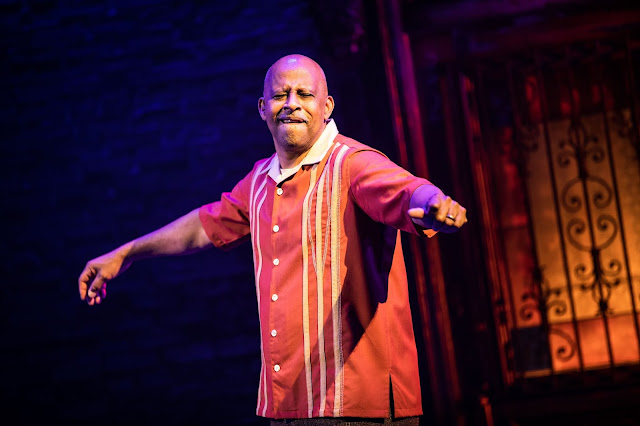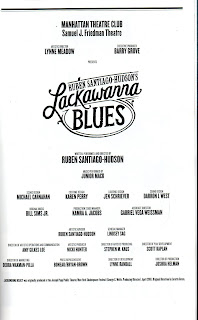 |
| Ruben Santiago-Hudson. (Photos: Mark J. Franklin.) |
 |
| Ruben Santiago-Hudson. |
Because there’s only one actor speaking all the lines and
playing all the characters, Lackawanna
Blues belongs to the category of one-person shows. It would, however, lose
a huge chunk of its theatrical punch without the awesome presence of Junior
Mack, the onstage guitarist who accompanies Mr. Santiago-Hudson, playing
low-key, bluesy background music by the late Bill Sims, Jr., during almost
every one the show’s ninety minutes.
 |
| Ruben Santiago-Hudson. |
Mr. Santiago-Hudson, a multitalented New York theatre
powerhouse, who also serves as MTC’s “artistic advisor,” is no stranger to the
solo format, having done just fine eight years ago starring at the Signature in
August Wilson’s How
I Learned What I Learned, a memorable performance strangely missing
from his Playbill bio. (Mr.
Santiago-Hudson, of course, is one of our leading Wilson exponents, both as an
actor and director.)
I didn’t see Lackawanna
Blues, based on Mr. Santiago-Hudson’s childhood experiences, when it was first produced back in 2001
at the Public Theatre, where George C. Wolfe directed its award-winning
production. This was followed in 2005 by a multiple award-winning HBO movie
version, starring S. Epatha Merkeson as Rachel “Nanny” Crosby, and a cornucopia
of first-line actors in support, among them Jimmy Smits (as Ruben’s father),
Terrence Howard, Mos Def, Rosie Perez, Delroy Lindo, Jeffrey Wright, and many
others.
These actors played the many colorful characters Mr.
Santiago-Hudson recalled from his boyhood growing up during the 1950s in Lackawanna,
an upstate New York working-class city, where circumstances saw him being
raised by the remarkable Nanny. She was a saintly Black woman who was both
entrepreneur and nonjudgmental overseer of those who, in one way or the other,
came to fall within her purview as a local boardinghouse proprietor. As lovingly
embodied by her onetime ward, she comes off as a pious woman of enormous
strength, courage, determination, wisdom, and gentleness, anchored by
inordinate depths of kindness.
Lackawanna Blues
is more a series of anecdotes built around the sturdy frame of Nanny than it is
a conventionally structured play. No matter. Mr. Santiago, dressed by Karen
Perry simply in slacks and a casual, rust-colored, cabana-type shirt, with beige stripes, like the
kind bowlers used to wear, ably presents the panoply of characters, men and women, he
recalls. Merely by shifts in voice, accent, body, and facial expression, he makes you see them parading across the stage.
Keep your eyes and ears peeled for Ol’ Po’ Carl, Mr. Lemuel Taylor, Numb Finger Pete, Sweet Tooth Sam, Mr. Luscious, and on and on and on, including the wide-eyed, innocent Mr. Santiago-Hudson once was. We see each with their limps, their coughs, their stuttering and muttering, their smoking, their boasting, their sweetness, their threats, their coolness, their neediness, their pride, and their suffering. And each is incarnated with grace, humor, affection, and sufficient accuracy to provide lifelike thumbnail portraits.
With Mr. Mack seated at right center, in and out of the shadows as lit by Jen Schriever with expressive sensitivity, Mr. Santiago freely roams Michael Carnahan’s set of a dark, crumbling, brick background. Into it is set no more than an an ornate, old-fashioned doorway, with a window of frosted, colored-glass panes high above. Hovering overhead down front is a rotating ceiling fan. In this memory-laden space, Mr, Santiago shows that he can not only act but sing (albeit minimally); even more impressive are those moments when he plays a really mean harmonica.
 |
| Ruben Santiago-Hudson. |
Each season brings an assortment of solo shows, most of them
revealing the striking talents of their performers. Just the day before seeing Lackawanna Blues I visited another
outstanding, albeit radically different, work in this category, Off Broadway’s Kristina
Wong: Sweatshop Overlord. Both shows are autobiographical, the first an
affectionate memorial to a long-gone slice of postwar African-Americana, the
latter a farcically inclined docudrama with a ripped-from-the headlines
political agenda. And both are among the best things I’ve seen during this
still young season.


